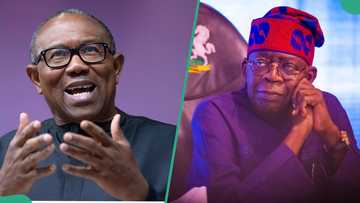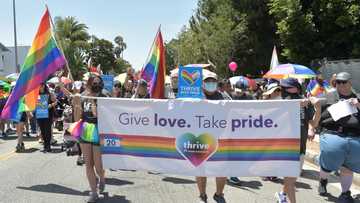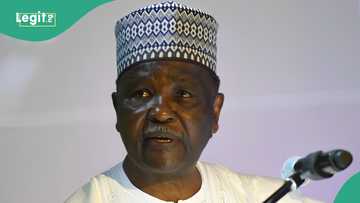Ondo 2024: Lack of Female Governorship Candidates Sparks Gender Inclusion Concerns
- The 2024 Ondo state governorship election has highlighted the lack of female representation in Nigerian politics, with no women running as flagbearers
- Despite a court ruling in 2022 mandating 35% of public sector appointments to go to women, the reality remains bleak for female political participation
- Political analysts attribute the absence of female candidates to systemic barriers, societal norms, and the lack of political will among parties to prioritise gender mainstreaming
Akure, Ondo state - The 2024 Ondo state governorship election has sparked critical discourse on gender representation in Nigerian politics, with no female candidates as flagbearers in the contest.
Despite continuous advocacies on the 35% affirmative action for women, the reality remains grim for female political participation.

Source: Getty Images
This glaring omission raises questions about systemic barriers and the role of women in addressing gender inequities within the political space.
Court's ruling on 35% affirmative action

Read also
“In severe hardship”: Peter Obi demands urgent action from Tinubu as terrorists invade Benue, kill 30
With no political party acknowledging the importance of women in the Ondo state gubernatorial election, it further dents Nigeria’s will to give room for the 35% affirmative action order issued by the Federal High Court on April 6, 2022.
It’s been well over two years since nine civil society organisations, led by the Nigerian Women Trust Fund (NWTF), secured victory in a legal battle that mandated the federal government enforce the National Gender Policy by allotting 35 per cent of appointments in the public sector to women.
After a stern legal battle faulting the federal government’s bias against the inclusivity of women in appointive and elective positions, the federal high court in Abuja ruled that:
“Dismantling barriers to women’s participation in public spheres has been achieved through progressive interpretation of municipal laws and international obligations and treaties.
“Formulating Policies based on s*ex, stereotyping, and feudal and patriarchal traditions will no longer be tolerated due to the supremacy of constitutional values.”
Nigerian lawyer speaks
Barrister Oladotun Hassan, NBA National Security Agencies Relations Committee member, assessed the issue.
In his words:
“The highest enemy of a woman in governance or government is a woman, not even the male folks. The women are usually the people who sing for the men at every political rally. But let one woman come out now; they will tag her as the chairman’s girlfriend or accuse her of sleeping around.”
Hassan highlighted societal and internal challenges women face, including stigma, low self-esteem, and lack of solidarity.
He called for robust movements to protect women in politics and suggested that organisations like the International Federation of Women Lawyers (FIDA) must intensify their advocacy.
“Any woman who expresses interest should be of interest to every other woman. Until women love themselves and realise their power, even a 100% affirmative action will yield little,” he stressed.
Rights activist blames political parties
Civil rights activist Auwal Musa Rafsanjani, Executive Director of the Civil Society Legislative Advocacy Centre, pointed to the lack of political will among parties.
He remarked:
“Political parties in Nigeria are not interested in gender mainstreaming. They are merchants of political power capture, not vehicles for equitable representation. Affirmative action is meant to address long-standing marginalisation, but the parties do not care about such principles.”
Rafsanjani attributed the absence of female candidates to the parties’ failure to mobilise on critical issues.
He noted that campaigns often lack substantive discussions, mirroring what he described as the accountability void in Nigeria's broader political landscape.
“If you look at the campaigns, none of them are issue-based. This is something they are learning from the president, who did not debate or commit to anything,” he added.
The systemic neglect of gender equity is a recurring theme in Nigerian politics. While women make up nearly half of the population, their representation in political offices remains dismal. Critics argue that this failure undermines democracy and stunts social progress.
Beyond the blame: Paths forward for women in politics
Both commentators agree that structural reforms and cultural shifts are essential to fostering gender inclusion.
Hassan emphasised the need for women to build collective strength and challenge societal norms that hinder their advancement. On the other hand, Rafsanjani called for establishing accountable political systems that prioritise inclusivity.
The lack of female candidacy in the Ondo election is not merely an oversight; it reflects deeper societal and institutional failings.
For Nigeria to truly embrace democracy, it must bridge the gender gap and create a political environment where women can thrive without prejudice.
As Hassan aptly put it, “Until women take proper orientation and stand together, the dream of gender parity in Nigerian politics will remain distant.”
With the election over, the absence of female candidates serves as a stark reminder of the work still needed to achieve gender equity.
It is a call to action for policymakers, advocacy groups, and citizens alike to prioritise the inclusion of women in governance—not just in Ondo State but across the nation.
Why Nigeria needs more women in governance
Earlier, Legit.ng reported that Barr. Juliet Isi Ikhayere, a House of Reps candidate in the 2023 elections, highlighted the need for deliberate efforts to empower women politically, citing societal and cultural barriers as key obstacles.
Also, former Kaduna senator Shehu Sani spoke to Legit.ng about why the Nigerian government has failed to implement the law reserving 35% of public offices for women.
Source: Legit.ng

Nurudeen Lawal (Head of Politics and Current Affairs Desk) Nurudeen Lawal is an AFP-certified journalist with a wealth of experience spanning over 8 years. He received his B/Arts degree in Literature-in-English from OAU. Lawal is the Head of the Politics/CA Desk at Legit.ng, where he applies his expertise to provide incisive coverage of events. He was named the Political Desk Head of the Year (Nigeria Media Nite-Out Award 2023). He is also a certified fact-checker (Dubawa fellowship, 2020). Contact him at lawal.nurudeen@corp.legit.ng or +2347057737768.

Auwal Musa Rafsanjani (Human rights activist) Auwal Musa Rafsanjani is the chairman of the Board of Amnesty International, Nigeria, and executive director of the Civil Society Legislative Advocacy Centre (CISLAC). Rafsanjani has been a member of Civil Liberties Organization and a member of The Center for Democracy and Human Rights. He was a founding member of Campaign for Democracy, led by late Beko Ransome Kuti, Democratic Alternative, also a member and coordinator of United Action for Democracy (UAD) led by Olisa Agbakoba.





